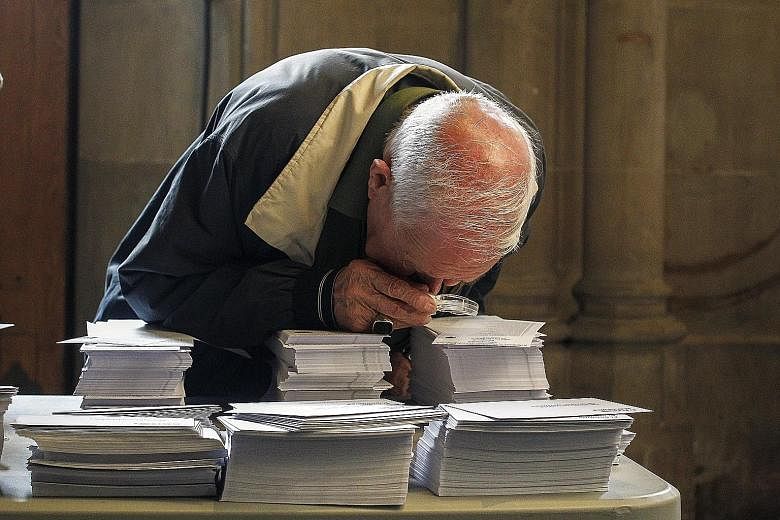BARCELONA • Catalans voted yesterday in an election dubbed crucial for the future of Spain, with polls pointing to a win by separatists who vow to declare the region independent by 2017.
The drive to break the north-eastern region away from Spain and create a new state in Europe has prompted a fierce stand-off with the Spanish government.
"Catalonia decides its future in Spain," ran yesterday's front-page headline in the centre-right national daily El Mundo.
-
WHY CATALONIA MATTERS
-
SECOND-BIGGEST REGION
Catalonia is home to 7.5 million of Spain's nearly 47 million people, making it the second-biggest region after Andalusia with 8.4 million. Nearly 73 per cent of its inhabitants speak Catalan and around 15 per cent are foreigners.
NEARLY A FIFTH OF SPAIN'S GDP
It accounted for 19 per cent of Spain's gross domestic product (GDP) last year, or nearly €200 billion (S$317 billion).
BIG BUSINESSES
Over 586,000 firms are based in Catalonia, most of them small and medium-sized businesses. It is home to nearly 2,150 bigger firms each employing over 200 people, such as clothes giant Mango. Volkswagen has a factory in the region where it makes vehicles under its Seat brand.
TOURIST MAGNET
With its capital Barcelona and Mediterranean beaches, Catalonia draws more foreign tourists than any other Spanish region. Just over 16.8 million foreigners visited last year, one quarter of Spain's total.
EXPORTS, FOREIGN INVESTMENTS
Catalonia accounted for 25 per cent of all Spanish exports last year. Since 2011, it has exported more products abroad than to the rest of Spain. It received 17 per cent of total foreign investment in Spain last year, or some €2.9 billion.
DEBT
It is the third most indebted of Spain's 17 semi-autonomous regions. Its debt in the second quarter of 2015 was equivalent to nearly a third of its GDP, according to the Bank of Spain.
UNEMPLOYMENT
Its jobless rate in the second quarter of 2015 stood at 19.1 per cent, below Spain's national average of 22.4 per cent.
MAJOR INFRASTRUCTURE
Barcelona is home to Spain's second busiest airport, with 37.6 million passengers last year, second only to Madrid. Its port is the nation's third busiest after Spanish cities Algeciras and Valencia, according to the World Shipping Council.
AGENCE FRANCE-PRESSE
After the Spanish government blocked Catalan regional president Artur Mas from holding a straight referendum, he cast yesterday's vote for the regional Parliament as a chance for "freedom" from rule by Madrid.
His separatist alliance has vowed to declare independence by 2017 if it secures a majority in Parliament, even without a majority of votes.
Spain's central government brands secession illegal and wants the country to stay united as the euro zone's fourth-biggest economy recovers from recession.
Voters turned out under cloudy skies in Barcelona, where red- and yellow-striped Catalan flags hung from buildings. Past polls have indicated that Catalans favour a referendum but are evenly divided over independence. Personalities such as Barcelona football club's beloved former coach Pep Guardiola and current defender Gerard Pique support independence.
"Without independence, nothing will change. This is a chance to turn everything around," said Mr Alex Donate, 29, who voted for Mr Mas' list in Barcelona.
Mr Donate, whose his parents are not from Catalonia originally, said: "I love Spain, but I think independence will be good for us."
Pensioner Mireia Galobart, 70, was worried, however, about the financial and economic stakes of secession. "Now is not the time to separate," she said, leaning on a cane.
The Spanish government has warned Catalonia risks plunging into financial chaos if it secedes.
"If they stop paying our pensions, that will affect me," said Madam Galobart. "I think Catalonia could stay with Spain but have a more autonomous government."
With its own language and cultural traditions, Catalonia has seen numerous bids for greater autonomy over the past century.
Secessionist demands have surged in the recent economic crisis. Nationalists complain they get less back from Madrid than they pay in taxes.
Mr Mas wants Catalonia to follow the example of Scotland and Quebec in Canada by holding a vote on independence - though in both those cases, most voters chose not to break away - and the legal barriers to a breakaway remain high.
The campaign also risks seeing Catalonia excluded from the European Union and its single currency, roiling the market for Spain's €1 trillion (S$1.6 trillion) of sovereign debt, and wrenching the industrial links that tie the region's manufacturers to clients and suppliers across the continent.
Polls ahead of yesterday's vote showed the conservative Mr Mas and his left-wing allies in the list "Together For Yes" could win a majority of the 135 seats in Parliament and nearly half the votes overall.
But to do so, they may need to strike an accord with the Popular Unity Candidacy, an anti-capitalist movement which could act as kingmaker.
More than 5.5 million of Catalonia's 7.5 million inhabitants were eligible to vote.
AGENCE FRANCE-PRESSE, BLOOMBERG



